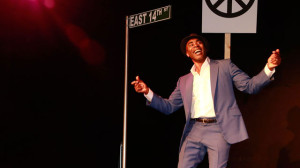Don Reed’s childhood is a comedic gold mine. The local comedian had a smash hit at the Marsh in 2009 with his one-man show East 14th: True Tales of a Reluctant Player, about his teen years growing up in Oakland in the 1970s, when he left his mother’s house and the life of a Jehovah’s Witness to move in with his dad, who (unbeknownst to Don) was a pimp. After a two-and-a-half-year run of that show, Reed unveiled a sequel covering his college years and odd jobs in Los Angeles, The Kipling Hotel: True Misadventures of the Electric Pink ’80s. Now he rolls out a prequel detailing his childhood in the 1960s, when his parents were still together: Can You Dig It? Back Down East 14th — The ’60s and Beyond.
In the new show, Reed immediately makes it clear why his autobiographical shows have been such huge successes. He’s an electrifying performer whose impressions of the colorful characters of his childhood are well-drawn and flat-out hilarious. His portraits are so well delineated that just a change of posture and facial expression often makes it clear who we’re dealing with in any given scene, and each has a distinct voice and characteristic tics all of his or her own.

Don’s father, a compulsive crowd-pleaser and incorrigible cheat, is always clowning around with his kids and withholds jokes as discipline. “My father really did love my mother,” Reed tells us. “He just wasn’t any good at it.” His mom is strict and serious but becomes indulgently playful with her husband when times are good. Young Don himself is a bundle of tics, always blinking and working his tongue between his teeth and lips. We meet Don’s super-square elder sister and mischievous little brother, and his two half-brothers: a budding criminal and a very fey gay teenager with an unnerving willingness to rumble. There’s the militant black-power bully always demanding Don’s milk money for the cause, and the shifty, well-named pimp Troutmouth with a knack for saying the wrong thing.
Like most shows at the Marsh, San Francisco’s hub for solo shows, there’s no set to speak of. A few placards are hung on the wall, showing a peace sign, a black-power fist, and the smiling face of little Don in a childhood photo. There’s also a free-standing street sign of, of course, East 14th St.



